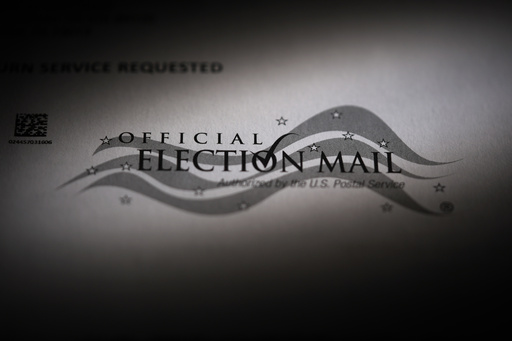
HARRISBURG, Pa. — The ongoing recount in Pennsylvania’s U.S. Senate race signifies the conclusion of a tumultuous post-election period, illustrating how disputed electoral regulations can reveal vulnerabilities within a fundamental aspect of American democracy.
The ballot tallying in the contest between incumbent Democratic Senator Bob Casey and his Republican challenger David McCormick has escalated into a situation marked by lengthy election board meetings, significant social media backlash, lawsuits, and allegations that certain county officials may be disregarding the law.
On November 7, the race was called for McCormick by news outlets after they determined that not enough ballots remained to be counted in areas where Casey was leading for him to gain the upper hand.
As the recount process proceeds, expected to conclude by next Tuesday, Republicans assert that Democrats are attempting to illegally retain McCormick’s seat by counting “illegal votes.” In contrast, Casey’s campaign claims that Republicans are working to suppress enough votes to inhibit his potential rise to victory.
Central to the contention is the requirement regarding the date written on the return envelopes for mail-in ballots.
Republicans argue that state law and established court rulings are unequivocal, stating that mail ballots should be discarded if their envelopes do not comply with the specified criteria. On the other hand, Democrats contend that ballots should not be rejected based on what they describe as minor technicalities.
Despite a ruling from the state Supreme Court just a few days before the election stating that these ballots should not be counted, several Democratic-led county election boards have proceeded to tally mail-in ballots that were either incorrectly dated or lacked a date entirely.
On Monday, the high court, controlled by Democrats, reaffirmed its authority with a 4-3 ruling that ordered local election boards to adhere to prior decisions that stipulated such ballots could not be included in the count.
“Only the courts under our charter may declare a statute, or provision thereof, unconstitutional,” stated Justice Kevin Brobson, a Republican.
Before Monday’s decision, some Democrats had claimed the legality surrounding the issue was ambiguous. Democratic-controlled boards in areas such as Montgomery County, Philadelphia, and Bucks County had opted to count ballots lacking proper dates, while Republicans emphasized that including a date is vital for maintaining ballot security.
Omar Sabir, chair of Philadelphia’s election board, indicated that a ruling from a county judge had recently demanded that his board count these ballots as part of a lawsuit concerning a special election held in September.
“I believe we, as commissioners, possess the discretion to decide which ballots may be counted, and that is our right under Pennsylvania statute,” Sabir mentioned on Tuesday.
However, the situation escalated following comments made by a Democratic commissioner from Bucks County, a crucial swing region situated just north of Philadelphia, which sparked outrage on social media along with threats of legal action from Republicans.
In a meeting last week, Bucks County Commissioner Diane Ellis-Marseglia, a Democrat, voted to count provisional ballots that were missing one of the two necessary signatures of the voter after being informed by a county attorney that state Supreme Court decisions had already declared such ballots uncountable.
“We all know that court precedents no longer carry weight in this country, and that laws are broken at will,” she stated. “For me, if I breach this law, it is because I wish to draw the attention of the courts. Counting votes is paramount.”
Her remarks rapidly circulated among conservative circles, often misrepresenting her statements as condoning the counting of mail ballots that arrived at local offices lacking proper dates.
“This represents a clear violation of the law, and we intend to resist it at every turn,” commented Lara Trump, daughter-in-law of President-elect Donald Trump and co-chair of the Republican National Committee, in a post on X that garnered significant attention.
Ellis-Marseglia did not respond to inquiries seeking clarification on her statements. Nonetheless, the chair of the county board, Democrat Bob Harvie, expressed in a statement that their intent was to safeguard voters’ rights, not to influence the election outcome.
This dispute regarding decisions by certain Democrats to undertake actions that seemed to contradict Pennsylvania law mirrors similar controversies in multiple states concerning the responsibilities of local election boards in the certification of results. In recent years, some Republican board members have refrained from certifying results, often without substantiating evidence, despite their obligations under state law.
Beginning in 2020, attacks on election certification initiated by then-President Trump and his supporters stirred concerns regarding the potential for partisan members of local boards to obstruct the electorate’s will without justification. This prompted numerous states led by Democrats to legislate clearer procedures.
In Pennsylvania, Republicans have been quick to challenge local Democrats for their decisions regarding the counting of mail-in ballots with the wrong date or lacking a date altogether. Republican National Committee Chairman Michael Whatley condemned the actions, labeling them “corrupt and despicable.”
“This type of conduct undermines public confidence in elections,” Whatley remarked during a press conference. “When election officials arbitrarily decide which rules to follow and which to overlook, it inherently erodes trust in the electoral process.”
When asked whether certain county officials might encounter legal ramifications, Whatley suggested that Republicans were examining their options and would pursue the matter rigorously.
Even amid the disarray, the ongoing ballot counting process this year may yield significant implications for the future.
Legal disputes arising from this situation could culminate in court rulings that establish what ballots are permissible in subsequent elections, stated Jeff Reber, a Republican leading the state’s elections reform committee representing county commissioners.
“No one anticipates that the recount will alter the election’s outcome,” he noted. “The true contention lies in determining which ballots will be counted, as this could set a crucial legal precedent.”
